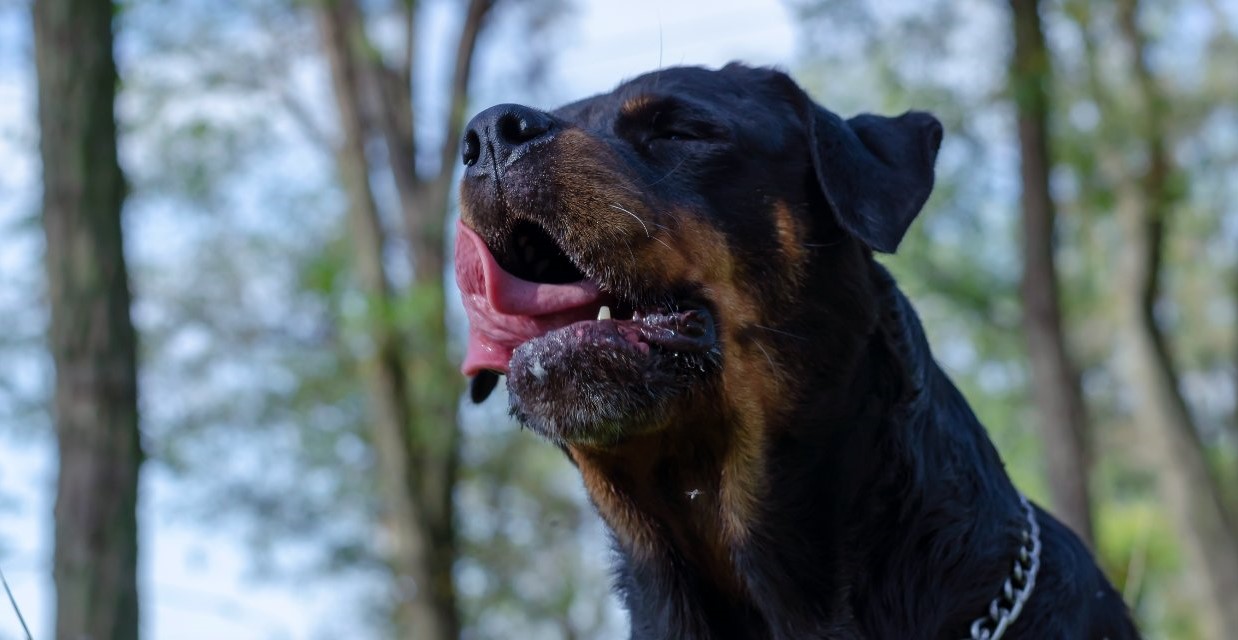Coughing is a common presentation in veterinary practice in dogs but this single clinical sign has multiple causes, so it is important that your vet determines the cause of the cough in order to prescribe the correct treatment.
The 5 most common causes of coughing in dogs are:
- Kennel cough
- Tracheal collapse
- Heart failure
- Parasites
- Pneumonia
1. Kennel Cough
Kennel cough, officially known as infectious tracheobronchitis, is a highly contagious upper respiratory tract infection caught when a dog breathes in infected particles from another affected dog. Kennel cough is caused by a combination of a virus (Canine Parainfluenza) and a bacteria (Bordetella bronchiseptica), which infect the cells that line the respiratory tract, leading to a harsh, dog dry cough or your dog coughing up phlegm.
In some dogs, it can lead to pneumonia.
It is called kennel cough because it is often picked up in kennels due to the close proximity of dogs while boarding together, but in reality, dogs can catch this in dog parks or simply breathing in an infected plume of air from another dog. Dogs are usually vaccinated against this infection, which assists in reducing the severity of disease. Your vet may prescribe a cough suppressant, anti-inflammatory or antibiotics depending on the severity and if there are any underlying health problems that may affect the body’s ability to fight the disease.
It is important to isolate an infected dog from other dogs for 2 weeks to prevent other dogs from catching the infection.
2. Tracheal Collapse
The trachea is the windpipe connecting the mouth with the lungs. The trachea consists of rings of cartilage, which hold the trachea in a cylindrical shape. In small-breeds of dogs, the tracheal cartilage can weaken with age, causing a flattening effect of the windpipe. This leads to a honking cough sound as air is pushed out during expiration. While surgery may be required in severe cases, the majority can be managed with weight loss, use of a harness instead of a neck collar and lead, cough suppressants, anti-inflammatories and restricted exercise.
3. Heart Failure
Coughing is a common presentation of dogs in congestive heart failure, particularly with a dog coughing at night. If your vet has identified loud heart murmur with the stethoscope, then it is possible that your dog has fluid on the lungs, known as pulmonary oedema, due to the heart not pumping properly.
Diuretics are required to reduce the load on the heart and other heart medications are used to improve the heart’s pumping ability. Heart murmurs are very common and not all coughing dogs with a heart murmur have heart failure, so your vet will most likely recommend some diagnostic tests to further investigate.
4. Parasites
Heartworm - In some areas of Australia, particularly the warmer climates, heartworm can be transmitted into the dog’s bloodstream via mosquito bites. The larvae grow into adult worms that live in the arteries of the heart. High worm burdens can cause coughing and heart failure.
Paralysis Tick - Along the east coast of Australia from Queensland to Southern NSW, ticks are rampant. The paralysis tick toxin starts causing clinical signs within 2-3 days of attachment and one of the early signs is retching, where owners often report their dog coughing up phlegm.
5. Pneumonia
Pneumonia is a serious infection of the lungs, which can lead to respiratory failure. The cause is variable, but can be due to an infectious agent (bacterial, fungal or viral) or secondary to laryngeal paralysis, vomiting or an inhaled foreign body. Dogs with pneumonia are often seriously ill requiring oxygen administration.
Diagnostic Investigation of Coughing in Dogs
When you bring your dog to the vet, it can be helpful If it is not immediately obvious to your vet what the problem is, or if your dog’s cough is persisting despite treatment, then further diagnostics will be recommended.
- Chest x-rays - Radiographs of the chest are an important first step in determining the cause of a cough in dogs and can also help rule out cancer as a cause
- Throat examination - Sedation and examination of the larynx in the dog’s throat can identify foreign bodies, obstructive upper airways or laryngeal paralysis
- Bronchoalveolar lavage - Fluid samples can be obtained by flushing a small amount of saline into the airway and sending it to the laboratory for analysis
- Bronchoscopy - A camera can be used while your dog is anaesthetised to look deep into the airways
- Heartworm test - A blood test can be obtained to check if your dog is positive for heartworm infection
- Tick clip - If tick toxicity is a suspected cause, your pet will need a very short clip to enable the tick(s) to be found
- Echocardiography - An ultrasound of the heart allows a more detailed examination while the heart is pumping
It is always best to seek veterinary attention if your dog develops a cough, as the cause can range from a simple infection to an emergency requiring immediate therapy.
By being aware of the variation in causes of a dog dry cough, you can better understand what tests may be needed to determine the exact cause.





